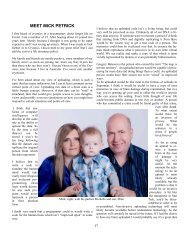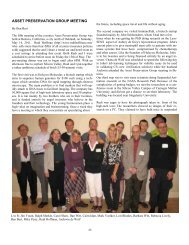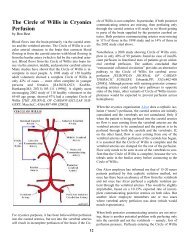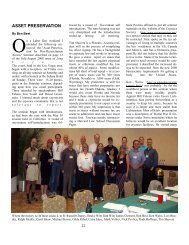Book Review, Comments and Letters - Cryonics Institute
Book Review, Comments and Letters - Cryonics Institute
Book Review, Comments and Letters - Cryonics Institute
Create successful ePaper yourself
Turn your PDF publications into a flip-book with our unique Google optimized e-Paper software.
"Being a Singularitarian has often been<br />
an alienating <strong>and</strong> lonely experience for<br />
me because most people I encounter do<br />
not share my outlook. Most "big thinkers"<br />
are totally unaware of this big<br />
thought. In a myriad of statements <strong>and</strong><br />
comments, people typically evidence the<br />
common wisdom that human life is short,<br />
that our physical <strong>and</strong> intellectual reach<br />
is limited, <strong>and</strong> that nothing fundamental<br />
will change in our lifetimes. I expect this<br />
narrow view to change as the implications<br />
of accelerating change become<br />
increasingly apparent, but having more<br />
people with whom to share my outlook is<br />
a major reason that I wrote this book."<br />
— Page 370<br />
Thanks, Ray. With Singularity you've<br />
not only made more friends, you've<br />
combined a tour de force <strong>and</strong> coupe de<br />
grâce for the inspiration of rationally<br />
idealistic people everywhere. I expect<br />
one day, just as we talk about the Christian<br />
era in terms of BC <strong>and</strong> AD, we'll<br />
have another basis for gauging the centuries:<br />
BK <strong>and</strong> AK. Kurzweil does a lot of<br />
heavy lifting, systematically demonstrating<br />
the realities of the new technology,<br />
even some current concerns about environment<br />
<strong>and</strong> energy. We have reason to<br />
be optimistic. In particular, clean energy<br />
costs will drop <strong>and</strong> availability will rise:<br />
"Today solar power costs an estimated<br />
$2.75 per watt. Several companies are<br />
developing nanoscale solar cells.... Industry<br />
sources indicate that once solar<br />
power falls below $1.00 per watt, it will<br />
be competitive for directly supplying<br />
electricity to the nation's power grid.<br />
Nanosolar [company] has a design<br />
based on titanium oxide nanoparticles<br />
that can be mass-produced on very thin<br />
flexible films. CEO Martin Roscheisen<br />
estimates that his technology has the<br />
potential to bring down solar-power<br />
costs to around 50 cents per watt by<br />
2006[1], lower than that of natural gas.<br />
Competitors Nanosys <strong>and</strong> Konarka have<br />
similar projections."— Page 250<br />
So in the lead up to the Singularity lie<br />
such important matters as cleanup of<br />
pollution <strong>and</strong> resolution of global warming<br />
caused by fossil-fuel carbon-dioxide<br />
emissions. Not an insignificant issue, as<br />
I've also discussed in several reviews.[2]<br />
"Of the three primary revolutions underlying<br />
the Singularity (genetics,<br />
nanotechnology, <strong>and</strong> robotics (GNR)),<br />
the most profound is R, which refers to<br />
the nonbiological intelligence that exceeds<br />
that of unenhanced humans. A<br />
more intelligent process will inherently<br />
outcompete one that is less intelligent,<br />
making intelligence the most powerful<br />
force in the universe." — Page 260<br />
Hard to believe intelligence will someday<br />
rule the world, at least from our<br />
current vantage point here in the murky<br />
shadows of George Bush, Sean Hannity,<br />
<strong>and</strong> Bill O'Reilly. But once we purge the<br />
world of pathocracy of all varieties <strong>and</strong><br />
achieve the vision of decentralized voluntary<br />
communities, success will become<br />
straightforward.<br />
To describe the panorama of fundamental<br />
observations made by Mr. Kurzweil<br />
would require a substantial book in itself.<br />
He begins by justifying the principles<br />
of technological evolution <strong>and</strong> the<br />
Law of Accelerating Returns, spends two<br />
chapters describing how to achieve the<br />
computational capacity of the human<br />
brain, outlines the impact on the human<br />
body or other enhanced intelligencecarrying<br />
framework, several sections on<br />
how to best contain or thwart the perils<br />
of malevolent strong AI (artificial intelligence),<br />
<strong>and</strong> finally some deep insightladen<br />
essays on consciousness <strong>and</strong> Singularity<br />
as Transcendence.<br />
"...Singularitarianism is not a system of<br />
beliefs or unified viewpoints. While it is<br />
fundamentally an underst<strong>and</strong>ing of basic<br />
technology trends, it is simultaneously<br />
an insight that causes one to rethink<br />
everything, from the nature of health <strong>and</strong><br />
wealth to the nature of death <strong>and</strong> self."<br />
— Page 371<br />
9<br />
UH-OH: CHRIS MANNING<br />
COMMENTS ON THE LAST<br />
ISSUE<br />
As we said once before, when Chris reads<br />
something, he must do it line by line. We<br />
thank him for bringing these things to our<br />
attention.<br />
CI President's Report (page 3)<br />
I hope rats <strong>and</strong> any other animals being<br />
used in experiments done on behalf of CI<br />
are being treated humanely. I would also<br />
hope that experiments on live animals are<br />
only being performed when there is no<br />
reasonable alternative<br />
I am a vegetarian <strong>and</strong> I am sympathetic to<br />
the aims of the animal liberation movement,<br />
but I am *not* convinced that animal<br />
experiments are always unjustified.<br />
A New Spirit of Preservation (page 5)<br />
I note the reference to 'baby boomers'. I<br />
was born in 1956. I remember that the<br />
term was in use in the mid to late '60s<br />
when I was a boy in Sydney, but at that<br />
time it referred only to people born in<br />
the first five (5) years after the War. So, I<br />
was *not* a ‘baby boomer’ then. Now, I<br />
gather, I *am* a 'baby boomer' as the term<br />
now refers to anyone born between 1946<br />
<strong>and</strong> 1960. (Or is it 1965?)<br />
Ending Aging (page 7)So the FDA does<br />
not regard ageing as a disease. I assume it<br />
regards progeria as a disease. I suggest<br />
that 'ordinary' ageing should be regarded<br />
as a disease as it differs from progeria only<br />
in degree <strong>and</strong> not in kind.<br />
Perhaps this argument could be put to the<br />
FDA? If it is true that more lives are lost<br />
than are saved by slow FDA approval of<br />
drugs then I would have thought they<br />
should be made aware of that argument as<br />
well.<br />
BTW this might be pedantry on my part,<br />
but it is probably better to use the word<br />
'youthful' rather than 'young' when referring<br />
to the rejuvnationtion of middle-aged<br />
mice.<br />
God Wants You Dead (page 10)<br />
The concern about people seeing these






